ESTEEMED CUISINE
Putting traditional South African food back on mainstream menus with a contemporary twist
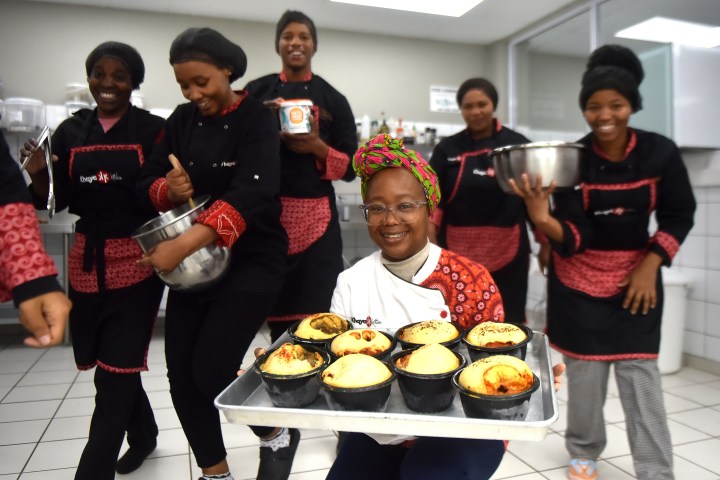
Traditional food: You can now get chicken feet and ‘smileys’ delivered to your home, thanks to a former MasterChef SA contestant.
Khaya Kepe is a very busy woman. Food ambassador, entrepreneur and former MasterChef SA contestant, she is a champion for traditional foods.
Her plans to launch her ready-made traditional food range in Spar supermarkets were interrupted by the Covid-19 pandemic. But she was undeterred and now supplies food to Gqeberha’s residents via Uber Eats.
“And they love it,” the 39-year-old mother of two says. “We even have customers who live outside of Uber Eats’ [delivery] range but are willing to pay for an Uber Connect to pick up their food and bring it to them.”
At 10am, the kitchen in the Werk 2 complex on the bank of the Baakens River is still waking up. “From about 11am when the Uber Eats orders start coming in, things get crazy here,” Kepe says.
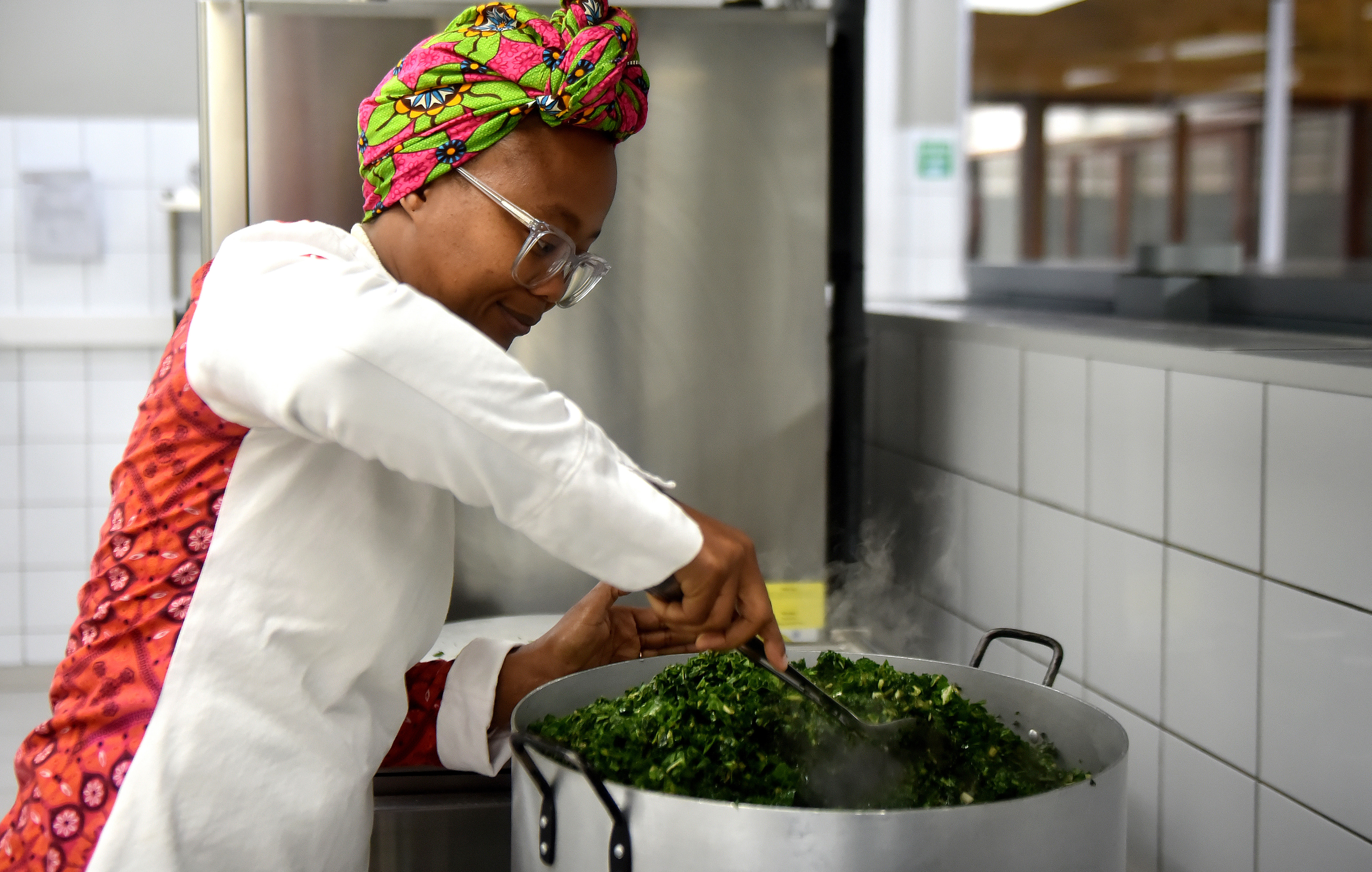
Khaya Kepe preparing food in Khaya’s Kitchen, Gqeberha, Eastern Cape. (Photo: Deon Ferreira)
On the menu is dombolo (dumplings) stuffed with lamb curry or beef stew, sheep head “smileys” (delivered in a pizza box, Kepe laughs), chicken livers, chakalaka, umfino (maize meal cooked with traditional greens), samp and beans as well as her grandmother’s apple pie with custard.
“I was born in a village called Mlamli in Sterkspruit. For me, village life meant being surrounded by family and food.
“Food played a very big part in our family. My grandparents had a big garden where my grandmother had all her crops, her pumpkins, her marrows, nice big chunky ones. My mom raised chickens…
“I grew up surrounded by all this food. We produced everything at home… Back then, shopping meant going to town, buying 50kg of maize meal and 50kg of flour. That is how we shopped.”
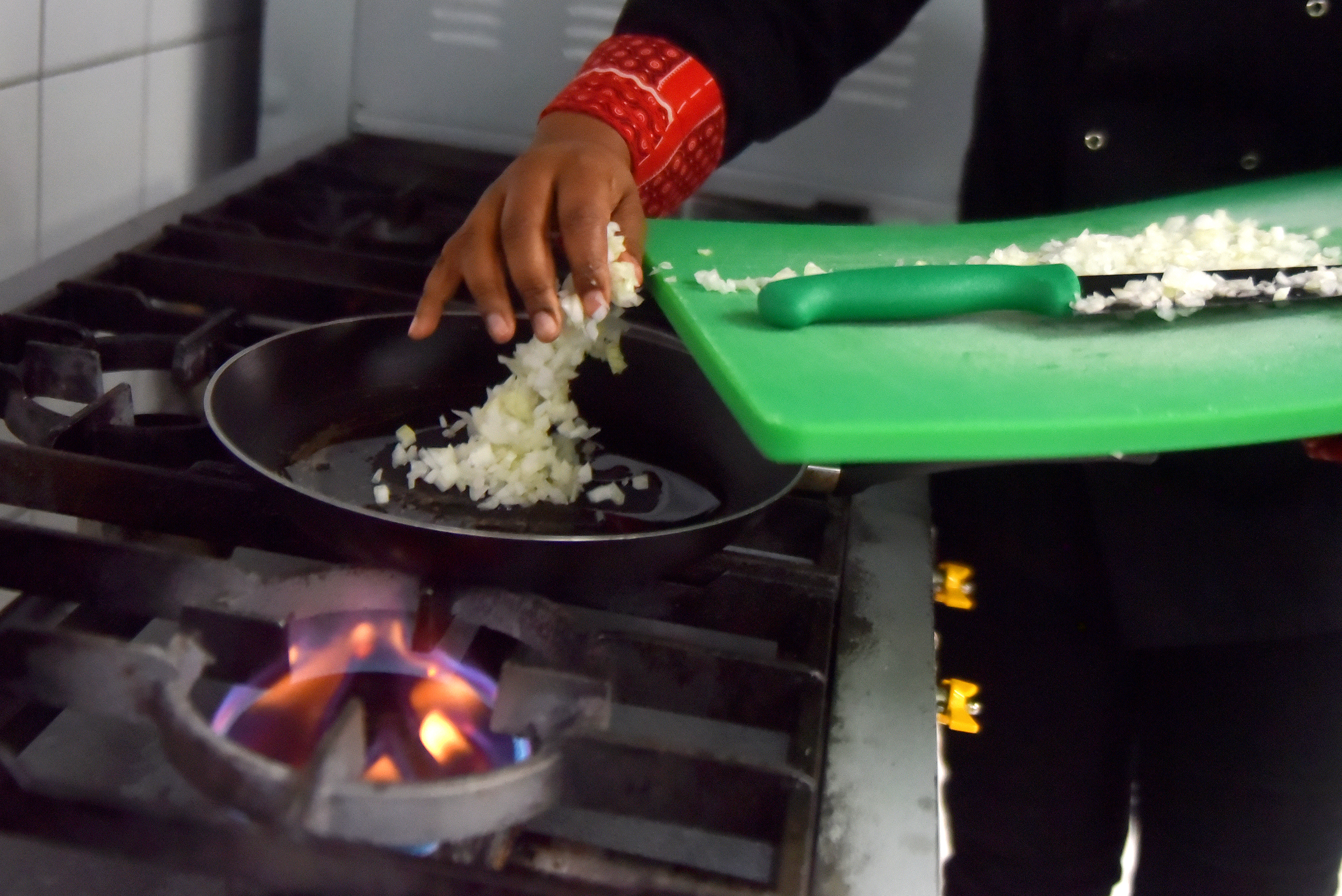
Grade 12 students learning and developing their cooking skills in Khaya’s kitchen, Gqeberha on 31 August, 2022. (Photo: Deon Ferreira)
A lot of people hear about village life, she says, and think of poverty and lack of resources. “But we never experienced that. I never felt like it. There was always an abundance of everything. It was just a way of life.
“We didn’t have running water. We were used to going to fetch water and firewood. But it is [about] the community … coming together. If there is a funeral, everyone comes together. If there is a celebration, everyone comes together.
“I think that is the thing that shaped me when it comes to loving food.”
Falling in love with food
When she was 10, Kepe moved to Cape Town to live with her paternal grandmother because her mother “wanted to send us to good schools”.
“Walking into my grandmother’s kitchen was the first time that I really fell in love with food. I had pasta for the first time. I didn’t know what pasta was. I experienced spices for the first time. She had this rack of Robertsons spices. I had never seen spices before. In the village spice was beef stock and salt. Or maybe curry powder.
“My grandmother worked for a hotel … in Constantia. She used to make the most delicious food and she used to bake… I still make her scone recipe to this day.”
It was not her plan to make a career out of food. “The dream for a girl from the village was that you will become a doctor or an accountant, that sort of thing. I went into marketing and communications. But I still had that passion for food.”
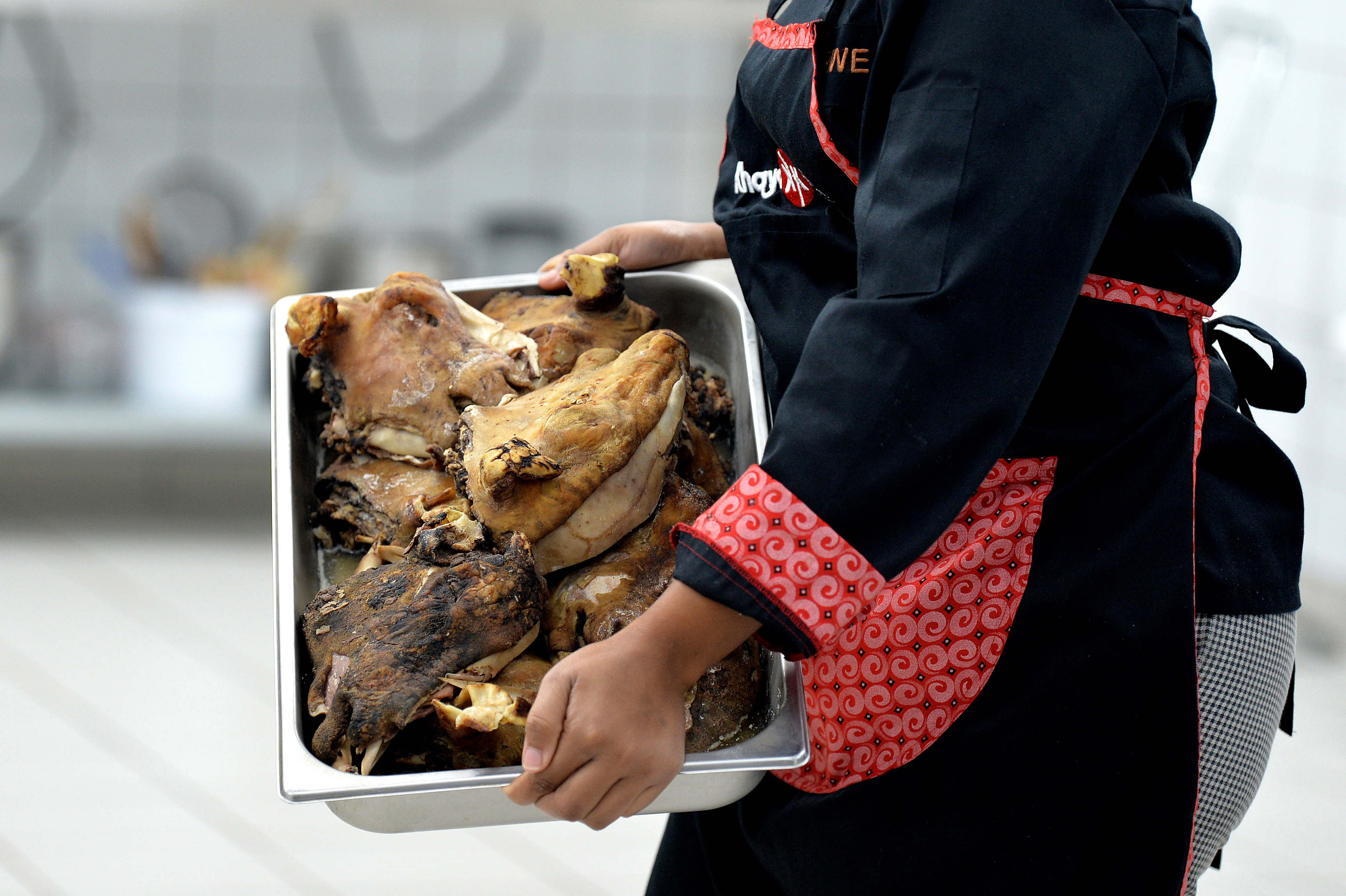
Students preparing traditional cuisine at Khaya’s Kitchen. (Photo: Deon Ferreira)
When auditions opened for the first series of MasterChef in South Africa, Kepe decided to give it a try.
“I said to my mom, ‘I am quitting my job to go into food full time’. ‘What?’ she told me,” Kepe laughs. “‘You can cook. Why must you go now and cook for a living? You can cook at home. You can cook for your friends. Why must you leave your job to go cooking?’.”
Visit Daily Maverick’s home page for more news, analysis and investigations
Several successful projects later, she has made her love for food into a career, having edited food pages, catered small jobs and appeared on television and radio programmes about food.
After she had her second child, the family moved to Gqeberha and started a company called Dainty Bites, making bite-sized traditional African-inspired food.
“When I first got here, I didn’t have the same client base I had in Johannesburg. But I had heard of the Valley Market. That is where I met the guys from Spar. They used to sponsor the market.”
Kepe wanted to do a food programme on Umhlobo Wenene, the isiXhosa radio station, and was looking for a sponsor.
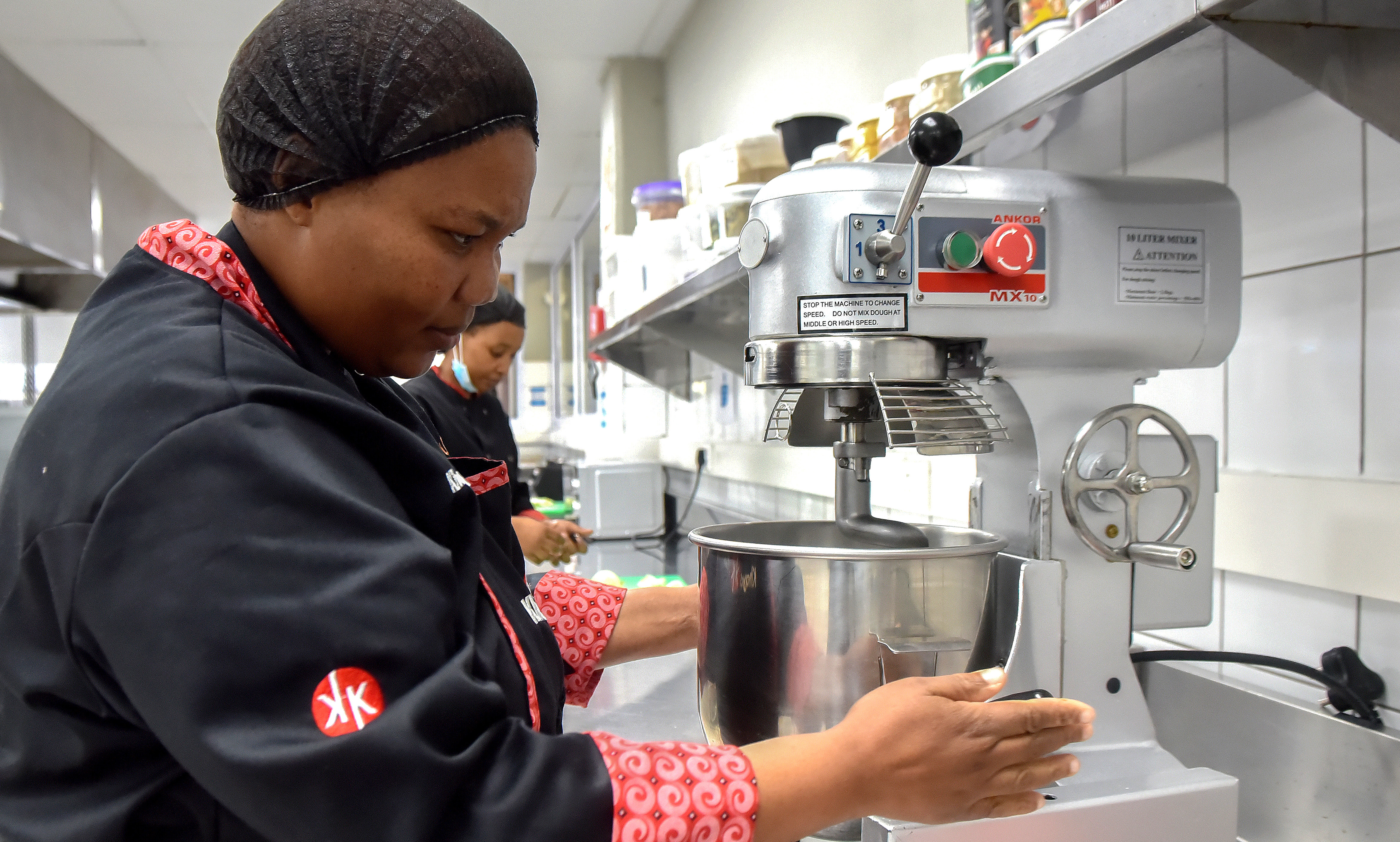
Students in action at Khaya’s Kitchen in Gqeberha, on 31 August 2022. (Photo: Deon Ferreira)
“So when I walked into [Spar’s] boardroom, the MD said: ‘But aren’t you the young lady I bought food from yesterday?’ I said yes. They sponsored my radio show and I started freelancing for them, training the ladies who work in the Spar kitchens.
“I saw how in almost every single store you would get samp and beans, you would get tripe, traditional food. But it wasn’t convenient. You had to stand in a queue. That is how Khaya’s Kitchen was born.
“I thought, ‘What if you can prepack traditional food for convenience, but make it contemporary?’ Not the stuff that I grew up eating [but] tripe spring rolls, samp risotto, chicken feet with ginger Asian glaze, things like that. I was trying to see how we can make it contemporary, for today’s market instead of making it village style.
“I also love the fact that traditional food is so undervalued and overlooked for the health benefits. People go all gaga over sourdough bread, but we grew up on it…
“I love fermented sorghum porridge for breakfast. Now we know that fermented food is really good for your gut. Umfino, those wild greens, is delicious and, in terms of vitamin and mineral content, it is better than spinach and kale. But we don’t talk about those things.
“That is when I said let’s embark on this journey as a brand, educate and also make it contemporary, more accessible for people to buy umfino, take it home and reheat it.”
But then Covid-19 happened just as she was getting ready to launch her product line.
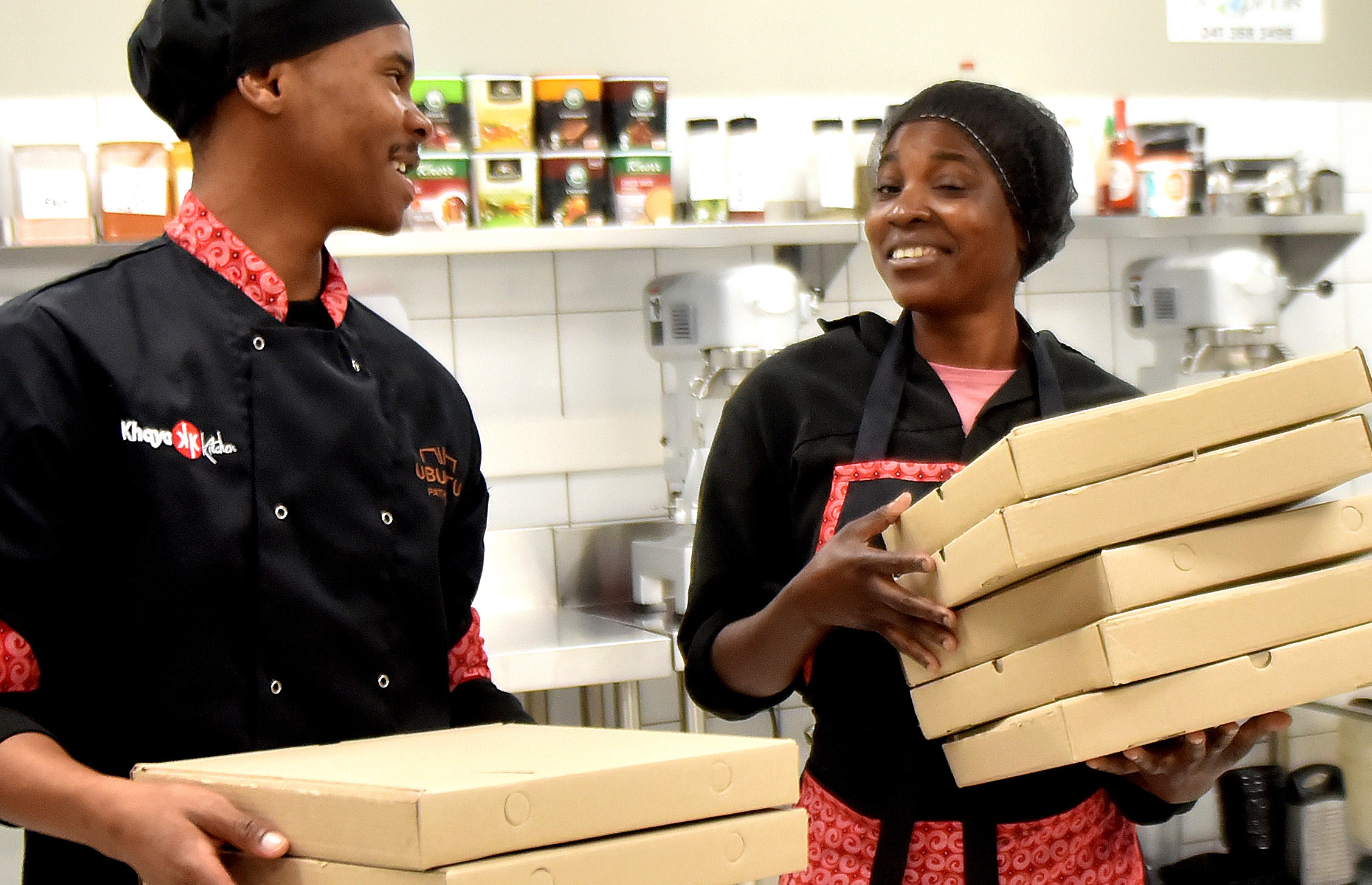
Students working at Khaya’s Kitchen in Gqeberha, where Grade 12 students are taught to become chefs. (Photo: Deon Ferreira)
“Our plans were to launch on 27 April 2020. Then the announcement came in March that we had to go into lockdown. We couldn’t trade.
“We only came back in August. Then the pilot phase in Gqeberha didn’t do that well because “people were more interested in cooking at home than going out and buying food”.
She then decided to go to the public directly and registered her meals on Uber Eats.
“People were very interested. The only place where you can buy traditional food is if you drive to the township. So we were bringing them convenience.”
Kepe partnered with Ubuntu Pathways to train young people from some of Nelson Mandela Bay’s poorest areas — New Brighton, Zwide and Veeplaas — for 12 months.
“Some of them are breadwinners. The little stipend that they get from us is the only income in the house. At least when they leave after 12 months they have a skill. They can go work in a kitchen or they can start their own little thing, in their own neighbourhood.”
This is her first intake and they have just catered their first big event. “I am already seeing that they have such great potential.”
Her long-anticipated roll-out to Spar will require about 60 people working two shifts a day to meet the demand of 100 stores.
Kepe wants to keep the conversation about traditional food going. “We must dissociate poverty from the value of food — our grandmothers didn’t feed us umfino because they were poor but because they knew the health benefits — then we can start celebrating it.
“We should start introducing it in mainstream restaurants and feeding schemes. We need to change the conversation from poverty to nutrition,” she says. DM168
This story first appeared in our weekly Daily Maverick 168 newspaper, which is available countrywide for R25.





















Comments - Please login in order to comment.